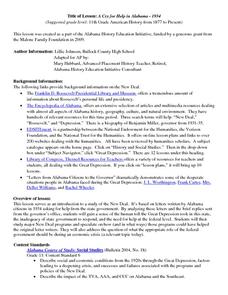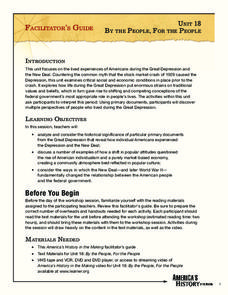Carolina K-12
F.D.R. and the New Deal
Discover how President Franklin D. Roosevelt sought to alleviate the hardships of the Great Depression by analyzing the words of his inaugural address and exploring the various New Deal programs he would later implement.
Alabama Department of Archives and History
New Deal Programs in Alabama
New Deal programs are the focus of an activity that prompts middle and high schoolers to consider the end of the Great Depression. Groups examine primary source materials to gain an understanding of how these programs were implemented in...
Curated OER
Great Depression and New Deal
The five activities outlined in this resource packet engage class members in projects that ask them to research the causes and the effects, both national and local, of the Great Depression and the New Deal policies of FDR.
Curated OER
The Great Depression and New Deal
Elementary pupils are introduced to the Great Depression as a critical period of hardship in United States history. They engage in collaborative assignments researching the Dust Bowl, the New Deal, US presidents, and presidential libraries.
Humanities Texas
A President's Vision: Franklin D. Roosevelt
This poster goes well beyond any traditional worksheet in allowing learners to analyze a variety of primary source documents related to the presidency of Franklin D. Roosevelt.
Alabama Department of Archives and History
A Cry for Help in Alabama - 1934
What should be the role of the federal government during an economic crisis? That is the question at the center of this introduction to a study of the New Deal. Class members examine letters to the state government asking for help,...
Annenberg Foundation
By the People, For the People
A picture speaks a thousand words—no matter how old. The 18th installment of a 22-part series on the making of American history has scholars research the causes of the Great Depression and the factors of the New Deal. Using photographic...
PBS
The Roosevelts: An Intimate History—Snapshot Lessons
The Roosevelt family was one of the most influential and prominent political forces in the 20th century, leaving behind a wide-ranging legacy of conservation, progressivism, and economic growth. Learn more about President Theodore...
Curated OER
FDR's Tree Army: Personal Turning Points in the CCC
What's the "deal" with the Civilian Conservation Corps? Primary sources help historians discover the impact of this landmark legislation. After an introductory slideshow and 7-minute video, groups analyze packets of images and a primary...
PBS
Master of the Airwaves: How FDR Used Radio to Ease the Public’s Fears
The political and economic climate during the 1930's was uncertain and tumultuous. But Americans' minds and hearts were eased with the reassuring words of their president, Franklin D. Roosevelt, and addresses over the radio. High...
Humanities Texas
Primary Source Worksheet: John T. McCutcheon, “A Wise Economist Asks a Question”
No joke! Kids learn how to read political cartoons using McCutcheon's drawing as a starting point and then progressing to other images found online.
Center for History Education
African Americans and the Democratic Party
Why did African American voters switch from the Republican Party to the Democratic party during the Depression Era? That is the question young historians attempt to answer as they study primary source documents from the period. The focus...
Historical Thinking Matters
Social Security: 1 Day Lesson
Should the United States provide relief for those who are unemployed? Trace this question back to the Great Depression with your young historians, who will engage in careful reading of historical documents and classroom discussion to...
National Endowment for the Humanities
NAACP's Anti-Lynching Campaign in the 1930s
Students examine the anti-lynching campaign sponsored by the NAACP in the 1930's. In this social justice lesson, students study the history of the anti-lynching campaign and determine why it was not successful. Students conduct research...















